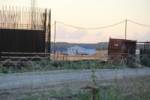Information the hard way

A cement factory outside Kerch in the Crimea has a glowing environmental impact assessment. The first problem is that the document was, perplexingly, put together in Donetsk which is a very long way from the proposed Crimean site for the factory. The second and key problem is that Kerch environmentalists, journalists and others are unconvinced by the document and point to numerous inaccuracies. The document, used to get a building permit, claims that there are no birds or plants listed in Ukraine’s Red Book. In 2012 ornithologists and scientists from the Onuksk Nature Reserve reported that there are several Red Book birds, plants and reptiles inhabiting this area.

One of the Red Book birds the assessment failed to notice
More than 2 years ago, in July 2011 the head of the factory promised to plant 380 hectares of forest. This is not for appearances – the factory is a danger to the environment and there needs to be a protective zone. No trees have yet been planted. Altcom claims that the Kerch authorities are stopping them; the latter say that it doesn’t depend on them. Within the boundaries of this proposed protective zone there are private dachas.
No public discussion was held about the cement factory though the implications for the residents of Kerch and outlying areas are obvious.
Iryna Sedova, journalist for CorruptUA and Kerch FM reports that the environmental impact assessment has been concealed now for two years. The assessment was “presented” at a press conference back in 2011. That was when residents of the resort city in the Crimea learned that the study had been carried out in Donetsk. Local scientists have dismissed the assessment’s predictions about the dispersion of emissions, and say that the concentric circles mentioned fail to take into account the very specific winds over Kerch. Another scientist believes that explosions in the quarry planned could cause subsidence of a part of the city. At the press conference, the presenters waved the document around, but refused to allow copies to be made.
At the beginning of 2013, civic activists demanded that the environmental prosecutor’s office carry out a check of the environmental impact assessment. This did not find any infringements but did stress that members of the public may carry out a public assessment of the documents.
But how? Despite Ukraine being a signatory to the Aarhus Convention on Access to Information, Public Participation in Decision-Making and Access to Justice in Environmental Matters, and in equal violation of the Public Information Act, journalists have not been able to get hold of the documents.
A court case seeking to oblige the Donetsk company to provide copies of the assessment is scheduled for 10.00 on November 29 in the Kerch City Court. The outcome should be clear, the documents forthcoming. That’s in theory. In practice, much will depend on critically needed public attention.
Halya Coynash





